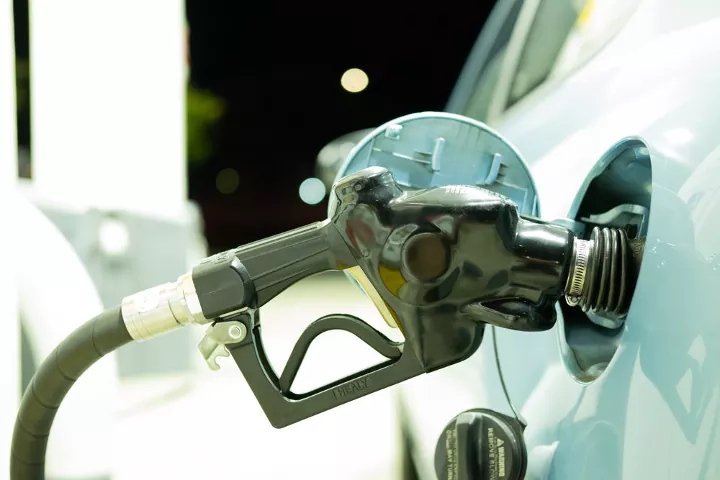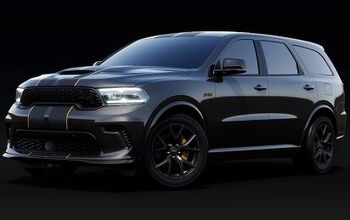Lobbyists Estimate Billions in Fines If New Fuel Economy Rules Adopted

A letter from talking heads at an outfit called the American Automotive Policy Council outlines what it estimates billions of dollars in fines could be levied at companies like General Motors and Stellantis if a government proposal to hike fuel economy standards through 2032 is adopted.
Reuters is reporting the concerns were sent to the U.S. Energy Department last week, citing “alarming” expected penalties for companies not meeting proposed Corporate Average Fuel Economy (CAFE) requirements. In a nutshell, the DOE is seeking to revise how it calculates petroleum-equivalent fuel economy ratings for electric vehicles and plug-in hybrids under CAFE. Currently known as MPGe, efficiency numbers for these machines use a byzantine morass of values for national electricity, petroleum generation, distribution efficiency, and even driving patterns.
Proposed rules would change these calculations and likely saddle EVs and PHEVs with MPGe values far below the digits they garner today. Examples cited by Reuters suggest machines like the Chrysler Pacifica plug-in hybrid could fall from 88.2 MPGe to 59.5 MPGe, potentially putting companies in a bind if they are relying on these vehicles to boost fleet numbers. Automakers tend to buy credits or pay fines if they cannot meet CAFE requirements.
Without delving into too much of their math, the American Automotive Policy Council is suggesting GM could be on the hook for $6.5 billion under the new rules, while the bill at Stellantis would be somewhere in the neighborhood of $3.0 billion. Companies like Ford and VW could also get dinged for about a billion bucks, apparently.
If you’re wondering, the AAPC bills itself as AAPC is an association based in Washington, D.C. which helps American Automakers deliver on commitments by representing Ford, GM, and Stellantis on “common public policy interests” at the federal and international levels. In broader terms, going to bat for them when the gubmint wants to change something. Matt Blunt is the group’s president and a former governor of Missouri.
[Image: Siripatv/Shutterstock]
Become a TTAC insider. Get the latest news, features, TTAC takes, and everything else that gets to the truth about cars first by subscribing to our newsletter.

Matthew buys, sells, fixes, & races cars. As a human index of auto & auction knowledge, he is fond of making money and offering loud opinions.
More by Matthew Guy
Latest Car Reviews
Read moreLatest Product Reviews
Read moreRecent Comments
- Rover Sig 2021 Jeep Grand Cherokee Limited, like my previous JGC's cheap to keep (essentially just oil, tires) until recent episode of clunking in front suspension at 50K miles led to $3000 of parts replaced over fives visits to two Jeep dealers which finally bought a quiet front end. Most expensive repair on any vehicle I've owned in the last 56 years.
- Bob Hey Tassos, have you seen it with top down. It's a permanent roll bar so if it flips no problem. It's the only car with one permanently there. So shoots down your issue. I had a 1998 for 10 years it was perfect, but yes slow. Hardly ever see any of them anymore.
- 3-On-The-Tree 2007 Toyota Sienna bedsides new plugs, flat tire on I-10 in van Horn Tx on the way to Fort Huachuca.2021 Tundra Crewmax no issues2021 Rav 4 no issues2010 Corolla I put in a alternator in Mar1985 Toyota Land Cruiser FJ60 280,000mi I put in a new radiator back in 08 before I deployed, did a valve job, new fuel and oil pump. Leaky rear main seal, transmission, transfer case. Rebuild carb twice, had a recall on the gas tank surprisingly in 2010 at 25 years later.2014 Ford F159 Ecoboost 3.5L by 80,000mi went through both turbos, driver side leaking, passenger side completely replaced. Rear min seal leak once at 50,000 second at 80,000. And last was a timing chain cover leak.2009 C6 Corvette LS3 Base, I put in a new radiator in 2021.
- ChristianWimmer 2018 Mercedes A250 AMG Line (W177) - no issues or unscheduled dealer visits. Regular maintenance at the dealer once a year costs between 400,- Euros (standard service) to 1200,- Euros (major service, new spark plugs, brake pads + TÜV). Had one recall where they had to fix an A/C hose which might become loose. Great car and fun to drive and very economical but also fast. Recently gave it an “Italian tune up” on the Autobahn.
- Bd2 Lexus is just a higher trim package Toyota. ^^


































Comments
Join the conversation
Meanwhile, the Automotive Alliance for Innovation, that represents the Big 3, blasted NHTSA's CAFE proposal, stating it "exceeds maximum feasibility", and will cost the automakers $14b in fines between 2027 and 2032.
NHTSA's reaction: Lol, just build more EVs, you silly gooses.
What happens if consumers revolt, won't buy EVs, and hold on to their old cars instead?
"Reuters is reporting the concerns were sent to the U.S. Energy Department last week, citing “alarming” expected penalties for companies not meeting proposed Corporate Average Fuel Economy (CAFE) requirements. In a nutshell, the DOE is seeking to revise how it calculates petroleum-equivalent fuel economy ratings for electric vehicles and plug-in hybrids under CAFE. Currently known as MPGe, efficiency numbers for these machines use a byzantine morass of values for national electricity, petroleum generation, distribution efficiency, and even driving patterns."
Its hard to keep track but didn't some unelected technocracy already decree the CAFE standards for 2024ish to be 49mpg? So now we're going to go full retard for 2030ish and tinker with our CAFE formula while simultaneously going to I think 58mpg? I have a better plan, you're all fired.